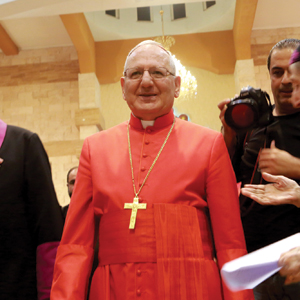Cameroon’s episcopal conference has announced that a bishop thought to have taken his own life in May “did not commit suicide, but was brutally murdered.
In a 13 June statement, the bishops called for justice in the face of “obscure diabolical forces” that killed 58-year-old Bishop Jean-Marie Benoît Balla of Bafia.
His funeral, initially scheduled for 14 June, has been postponed indefinitely, following the Vatican’s request that President Paul Biya and the Cameroonian authorities provide information about Bishop Balla’s death.
A post mortem has pointed to murder, showing “clear signs of violent death, and no evidence of death by drowning”.
It was conducted by a team of doctors, including an expert appointed by the episcopal conference. There were signs on Bishop Balla’s body that he may have been tortured and that he was dead before his body entered the river where it was found.
The bishops expressed fear that the Catholic Church is being persecuted, as Bishop Balla is the latest of several Catholic priests to have died in mysterious circumstances in recent months.
Unexplained deaths of Cameroonian clergy date back three decades.
Local papers in Cameroon have been speculating about the transfer to Indonesia of the Apostolic Nuncio in Yaounde, Archbishop Piero Pioppo, 57, since Bishop Balla’s death. Some suggest that Bishop Balla wrote an explosive letter to the nuncio following the mysterious death of the rector of Bafia’s minor seminary on 10 May.
Unconfirmed rumours suggest that Bishop Balla was about to expose the Government’s alleged involvement in that death. Archbishop Pioppo could not be reached for comment. The nunciature in Indonesia told The Tablet on Monday that “he has not arrived yet”.
Bishop Balla was reported missing on 31 May and his body was found in a river on 2 June. A “suicide note” in French, which said: “I am in the water”, was found in his car 10 miles upstream.
While some of the bishop’s close aides said that the note appeared to be in the bishop’s handwriting, they added that the phraseology was entirely untypical, and they questioned whether, if the letter was in his own hand, it might have been written under duress.


 Loading ...
Loading ...